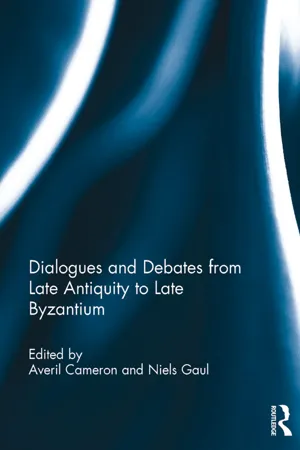
Dialogues and Debates from Late Antiquity to Late Byzantium
- 284 pages
- English
- ePUB (mobile friendly)
- Available on iOS & Android
Dialogues and Debates from Late Antiquity to Late Byzantium
About This Book
Dialogues and Debates from Late Antiquity to Late Byzantium offers the first overall discussion of the literary and philosophical dialogue tradition in Greek from imperial Rome to the end of the Byzantine empire and beyond. Sixteen case studies combine theoretical approaches with in-depth analysis and include comparisons with the neighbouring Syriac, Georgian, Armenian and Latin traditions. Following an introduction and a discussion of Plutarch as a writer of dialogues, other chapters consider the Erostrophus, a philosophical dialogue in Syriac, John Chrysostom's On Priesthood, issues of literariness and complexity in the Greek Adversus Iudaeos dialogues, the Trophies of Damascus, Maximus Confessor's Liber Asceticus and the middle Byzantine apocryphal revelation dialogues. The volume demonstrates a new frequency in middle and late Byzantium of rhetorical, theological and literary dialogues, concomitant with the increasing rhetoricisation of Byzantine literature, and argues for a move towards new and exciting experiments. Individual chapters examine the Platonising and anti-Latin dialogues written in the context of Anselm of Havelberg's visits to Constantinople, the theological dialogue by Soterichos Panteugenos, the dialogues of Niketas 'of Maroneia' and the literary dialogues by Theodore Prodromos, all from the twelfth century. The final chapters explore dialogues from the empire's Georgian periphery and discuss late Byzantine philosophical, satirical and verse dialogues by Nikephoros Gregoras, Manuel II Palaiologos and George Scholarios, with special attention to issues of form, dramatisation and performance.
Frequently asked questions
Information
Table of contents
- Cover
- Title
- Copyright
- Contents
- List of contributors
- Acknowledgements
- Introduction
- 1 Plutarch’s dialogues: beyond the Platonic example?
- 2 Erostrophus, a Syriac dialogue with Socrates on the soul
- 3 The rhetorical mechanisms of John Chrysostom’s On Priesthood
- 4 Literary distance and complexity in late antique and early Byzantine Greek dialogues Adversus Iudaeos
- 5 Prepared for all occasions: the Trophies of Damascus and the Bonwetsch Dialogue
- 6 New wine in old wineskin: Byzantine reuses of the apocryphal revelation dialogue
- 7 Dialogical pedagogy and the structuring of emotions in Liber Asceticus
- 8 Anselm of Havelberg’s controversies with the Greeks: a moment in the scholastic culture of disputation
- 9 A Platonising dialogue from the twelfth century: the logos of Soterichos Panteugenos
- 10 The six dialogues by Niketas ‘of Maroneia’: a contextualising introduction
- 11 Theodore Prodromos in the Garden of Epicurus
- 12 ‘Let us not obstruct the possible’: dialoguing in medieval Georgia
- 13 Embedded dialogues and dialogical voices in Palaiologan prose and verse
- 14 Nikephoros Gregoras’s Philomathes and Phlorentios
- 15 Dramatisation and narrative in late Byzantine dialogues: Manuel II Palaiologos’s On Marriage and Mazaris’ Journey to Hades
- 16 Form and content in the dialogues of Gennadios Scholarios
- Bibliography
- Index